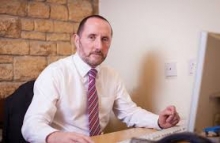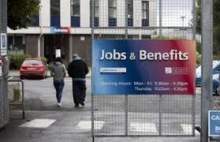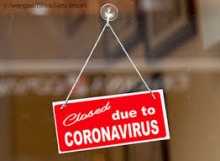Work TV
Watch our TV Channel dedicated to the ‘World of Work’. Explore our video library for informative videos featuring career opportunities at leading companies, franchising opportunities, further education and recruitment professions and their services.
Simon Collyer
George Monbiot Explains in A Guardian Article Why Lies Matter More Than Lives
FAKE NEWS - Why do we value lies more than lives? We know that certain falsehoods kill people. Some of those who believe such claims as “coronavirus doesn’t exist”; “it’s not the virus that makes people ill, but 5G”; or “vaccines are used to inject us with microchips” fail to take precautions or refuse to be vaccinated, then contract and spread the virus. Yet we allow these lies to proliferate.
Some falsehoods about the pandemic are so dangerous that they should be banned.
By George Monbiot, published in the Guardian 27th January 2021
We have a right to speak freely. We also have a right to life. When malicious disinformation – claims that are known to be both false and dangerous – can spread without restraint, these two values collide head on. One of them must give way, and the one we have chosen to sacrifice is human life. We treat free speech as sacred, but life as negotiable. When governments fail to ban outright lies that endanger people’s lives, I believe they make the wrong choice.
Any control of what we may say by governments is dangerous, especially when the government, like ours, has authoritarian tendencies. But the absence of control is also dangerous. In theory, we recognise that there are necessary limits to free speech: almost everyone agrees that we should not be free to shout “fire!” in a crowded theatre, because people are likely to be trampled to death. Well, people are being trampled to death by these lies. Surely the line has been crossed?
Those who demand absolute freedom of speech often talk about “the marketplace of ideas”. But in a marketplace, you are forbidden to make false claims about your product. You cannot pass one thing off as another. You cannot sell shares on a false prospectus. You are legally prohibited from making money by lying to your customers. In other words, in the marketplace there are limits to free speech. So where, in the marketplace of ideas, are the trading standards? Who regulates the weights and measures? Who checks the prospectus? We protect money from lies more carefully than we protect human life.
I believe that spreading only the most dangerous falsehoods, like those mentioned in the first paragraph, should be prohibited. A possible template is the Cancer Act, which bans people from advertising cures or treatments for cancer. A ban on the worst Covid lies should be time-limited, running for perhaps 6 months. I would like to see an expert committee, similar to SAGE, identifying claims that present a genuine danger to life, and proposing their temporary prohibition to Parliament.
While this measure would apply only to the most extreme cases, we should be far more alert to the dangers of misinformation in general. The new Anti-Virus site might help to tip the balance against those people, such as Toby Young, Allison Pearson, Peter Hitchens, Sunetra Gupta and Carl Heneghan, who have made such public headway with their misleading claims about the pandemic.
But how did these claims become so prominent? They achieved traction only because they were given a massive platform in the media, particularly the Telegraph, the Mail and, above all, the house journal of unscientific gibberish, the Spectator. Their most influential outlet is the BBC. The BBC has an unerring instinct for misjudging where debate about a matter of science lies. It thrills to the sound of noisy, ill-informed contrarians. As the conservationist Stephen Barlow argues, science denial is destroying our societies and the survival of life on Earth. Yet it is treated by the media as a form of entertainment. The bigger the idiot, the greater the airtime.
Interestingly, all but one of the journalists mentioned on the Anti-Virus site also have a long track record of downplaying and, in some cases, denying, climate breakdown. Peter Hitchens, for example, has dismissed not only human-made global heating, but the greenhouse effect itself. Today, climate denial has mostly dissipated in this country, perhaps because the BBC has at last stopped treating climate change as a matter of controversy, and Channel 4 no longer makes films claiming that climate science is a scam. The broadcasters kept this disinformation alive, just as the BBC, still providing a platform for misleading claims this month, sustains falsehoods about the pandemic.
Ironies abound, however. One of the founders of the admirable Anti-Virus site is Sam Bowman, a senior fellow at the Adam Smith Institute(ASI). This is an opaquely-funded lobby group with a long history of misleading claims about science, that often seem to align with its ideology or the interests of its funders. For example, it has downplayed the dangers of tobacco smoke, and argued against smoking bans in pubs and plain packaging for cigarettes. In 2013, the Observer revealed that it had been taking money from tobacco companies. Bowman himself, echoing arguments made by the tobacco industry, has called for the “lifting all EU-wide regulations on cigarette packaging” on the grounds of “civil liberties”. He has railed against government funding for public health messages about the dangers of smoking.
Some of the ASI’s past claims about climate science – such as statements that the planet is “failing to warm” and that climate science is becoming “completely and utterly discredited” – are as idiotic as the claims about the pandemic that Bowman rightly exposes. The ASI’s Neoliberal Manifesto, published in 2019, maintains, among other howlers, that “fewer people are malnourished than ever before”. In reality, malnutrition has been rising since 2014. If Sam Bowman has suddenly become a defender of science, perhaps he could call out some of the falsehoods spread by his own organisation.
Lobby groups funded by plutocrats and corporations, like the ASI, are responsible for much of the misinformation that saturates public life. The launch of the Great Barrington Declaration, for example, that champions herd immunity through mass infection, with the help of discredited claims, was hosted – physically and online – by the American Institute for Economic Research. This institute has received money from the Charles Koch Foundation, and takes a wide range of anti-environmental positions.
It’s not surprising that we have an inveterate liar as Prime Minister: this government has emerged from a culture of right-wing misinformation, weaponised by think tanks and lobby groups. False claims are big business: rich people and organisations will pay handsomely for others to spread them. Some of those whom the BBC used to “balance” climate scientists in its debates were professional liars paid by fossil fuel companies.
Over the past 30 years, I have watched this business model spread like a virus through public life. Perhaps it is futile to call for a government of liars to regulate lies. But while conspiracy theorists make a killing from their false claims, we should at least name the standards that a good society would set, even if we can’t trust the current government to uphold them.
Reproduced by kind courtesy of the Guardian Newspaper.
ABC Comment have your say below:

Irish Minister for Housing Under Fire Over Emergency Homeless Accommodation Allocation
IRELAND - Social Democrats TD Cian O’Callaghan (left) has expressed frustration after the Minister for Housing was again unable to provide clear answers as to why homeless people are still being turned away from emergency accommodation.
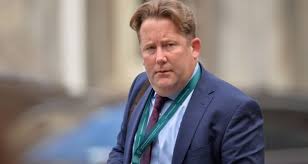
Image: Minister for Housing Minister O’Brien.
Speaking after tackling Minister O’Brien on the issue in the Dáil today, Deputy O’Callaghan, who is the party’s Housing spokesperson, commented:
"Minister O'Brien has previously insisted that homeless people were not being turned away from emergency accommodation. That is clearly not the case, as evidenced by the recent ‘RTÉ Investigates’ programme which confirmed what homeless organisations have been saying.
“The Minister gave no real answers in the Dáil today as to why some of our most vulnerable people are not being provided with emergency beds.
"Clearly, what we have here is a Minister in denial. He said he would end the practice of people being turned away from emergency accommodation on the grounds of not having a connection to a local area. He was asked to come clean and admit that people are still being turned away, and he wouldn't.
"The Minister is avoiding any responsibility for dealing with homelessness. He has given answers which suggest he will take action, but then he doesn't follow through. What we have here is a Housing Minister who is better at soundbites than he is at solutions and he seems to be showing very little interest in tackling the homelessness crisis.”
ABC Comment, have your say below:

TUC Warn of Wave of Unfair Dismissal Cases as Unemployment Increases
TUC WARNING – The TUC have been warning people just how vulnerable workers are too unfair dismissal.
The Conservative-led coalition increased the qualifying period for unfair dismissal from 12 months to 24 months in 2012.
1 in 4 workers are vulnerable to unfair dismissal.
The TUC has today (Friday) warned that millions of workers lack basic protections if they lose their jobs in the coming months.
New analysis shows that 7.5 million employees (1 in 4) began this year with no protection from unfair dismissal.
Under current law, workers must be employed for two years to qualify for unfair dismissal protection.
The TUC says this should be a day one right.
Hard-hit sectors
People working in industries hit hardest by the pandemic – such as hospitality and retail – are most at risk of missing out on key protections, says the TUC.
Nearly half (45%) of hospitality staff have not been in their jobs long enough to qualify for unfair dismissal rights.
And a third (32%) of people working in the retail, wholesale and vehicle repair sector don’t qualify for unfair dismissal rights.
The TUC says these figures are deeply worrying with unemployment set to rise further.
BME and young workers most likely to miss out.
The TUC says BME and young workers are most at risk of not being protected from unfair dismissal.
Over half (56%) of 20–24-year-olds and two-fifths (40%) of 25-29 year-olds do not qualify for unfair dismissal.
This is particularly concerning as previous TUC analysis has shown that workers aged 25 and under are three times more likely than those over 25 to work in either accommodation and food, or arts, entertainment, and recreation – two of the industries hardest hit by the virus.
The picture is also bleak for many BME workers. 1 in 3 (33%) have no protection from unfair dismissal, compared to a quarter (25%) of white workers.
Levelling up pay and conditions.
The government promised in 2019 that it would bring forward a new employment bill to improve people’s protections at work.
But there has been no sign of the legislation. Ministers instead began reviewing hard-won rights from the EU with the view to potentially watering them down.
The union body says all workers should have unfair dismissal rights from day one in the job.
The analysis shows that even returning to the previous qualifying period for unfair dismissal of 12 months would benefit 3.6 million workers – including around a million workers in health and social care and the wholesale and retail sectors.
The TUC says that improving workers’ rights and pay is a key test of Boris Johnson’s much-vaunted ‘levelling up’ agenda.
Commenting on the analysis, TUC General Secretary Frances O’Grady said:
“The government must do everything possible to stop mass unemployment.
“This includes strengthening protections at work so people can’t be sacked unfairly. No-one should be treated as disposable labour.
“If the government is serious about levelling up Britain it must level up workers’ rights – not water down hard-won rights from the EU.
“People shouldn’t have to wait for two years to be protected from unfair dismissal. They should be day one rights for everybody.”
The TUC is calling on the government to:
- reform the qualifying period for unfair dismissal
- ban zero-hours contracts
- bring in genuine two-way flexibility by giving workers a default right to work flexibly from the first day in the job, and all jobs to be advertised as flexible
- create good quality jobs by fast-tracking £85bn of spending on green infrastructure
- establish a national recovery council, made up of businesses and unions alongside the government, to steer the recovery effort.
ABC Note:
A breakdown of the proportion of employees employed for less than two years by industry
|
Industry |
Employed for more than one year but less than two |
Employed for less than two years |
Total employees |
Percentage of employees employed for less than two years |
|
Accommodation and food services |
280,883 |
645,867 |
1,438,098 |
45 |
|
Households as employers |
4,077 |
7,481 |
20,629 |
36 |
|
Admin and support services |
191,546 |
393,179 |
1,155265 |
34 |
|
Wholesale, retail, repair of vehicles |
522,279 |
1,153,173 |
3,557,384 |
32 |
|
Information and communication |
200,831 |
426,427 |
1,320,875 |
32 |
|
Arts, entertainment and recreation |
100,299 |
176,418 |
583,250 |
30 |
|
Health and social work |
543,426 |
1,123,662 |
4,140,321 |
27 |
|
All industries |
3,616,141 |
7,513,123 |
27,694,864 |
27 |
|
Prof, scientific, technical activ. |
296,059 |
548,506 |
2,072,495 |
26 |
|
Agriculture, forestry and fishing |
14,379 |
39,727 |
153,774 |
26 |
|
Real estate activities |
49,752 |
86,020 |
333,418 |
26 |
|
Construction |
172,308 |
345,418 |
1,339,882 |
26 |
|
Other service activities |
65,260 |
143,292 |
562,876 |
25 |
|
Financial and insurance activities |
154,822 |
314,426 |
1,263,569 |
25 |
|
Electricity, gas, air cond supply |
20,615 |
44,916 |
183,052 |
25 |
|
Mining and quarrying |
16,477 |
26,640 |
113,431 |
23 |
|
Education |
359,563 |
740,462 |
3,167,784 |
23 |
|
Transport and storage |
132,756 |
296,193 |
1,278,696 |
23 |
|
Manufacturing |
277,827 |
546,424 |
2,541,815 |
21 |
|
Water supply, sewerage, waste |
18,043 |
45,952 |
217,468 |
21 |
|
Public admin and defence |
191,250 |
403,977 |
2,200,538 |
18 |
|
Extraterritorial organisations |
3,689 |
4,963 |
50,244 |
10 |
Source: ONS labour force survey
ABC Comment, have your say below:

Those On Low Incomes Losing Their Broadband Connections and Their Connection to Society Say Citizens Advice
More than one in six people are struggling to afford their broadband during the third lockdown, Citizens Advice has found.
This comes at a time when people are more reliant on broadband to work, teach their children and order essentials.
Citizens Advice found that during the first lockdown, certain groups, including people with children, disabled people, people from Black, Asian or ethnic minority backgrounds, those who were shielding and young people were particularly struggling with their broadband bill.
It also found broadband customers in receipt of low-income benefits such as Universal Credit were almost twice as likely to struggle to pay their bill as other customers.
Towards the end of last year, an estimated 2.3 million people had fallen behind on their broadband bill, according to the charity.
In December, regulator Ofcom found that if households were paying the average £37 a month for landline and broadband, this would take around four times the proportion of a low-income household’s budget, compared to an average household.
It “strongly urged” all providers to consider offering cheaper tariffs for those on a low income or who are struggling financially.
Citizens Advice is calling on the government and Ofcom to fast-track these plans by making it compulsory for all providers to offer affordable tariffs to people on low-income benefits. Only three of the largest 13 firms currently offer these tariffs.
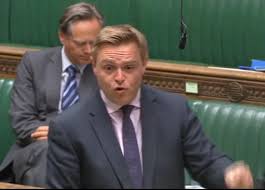
Image: Colchester MP and DWP minister Will Quince.
ABC Note: The ABC argued to our MP Will Quince, a DWP minister some time ago that broadband should be treated as a utility like water, electricity or gas. Citizens need broadband to look for work and to communicate with family and friends. Broadband is not a luxury. We are concerned that many people on benefits are now so poor they are having to give up broadband and even mobile phone airtime. They are not being simply excluded from job-seeking without this connectivity, they are no longer fully participating members of society.

Committee Takes Evidence From Rough Sleeping Minister Eddie Hughes In Covid-19 And Homelessness Inquiry
Thursday 28 January, 3.30pm
Watch the session live at www.parliamentlive.tv
The Housing, Communities and Local Government Committee takes evidence from newly appointed Parliamentary Under Secretary of State for Rough Sleeping & Housing, Eddie Hughes MP on Thursday 28 January in the final session of its inquiry into the impact of Covid-19 on homelessness and the private rented sector.
As part of its response to the Covid-19 pandemic, the Government initiated a number of policies to support rough sleepers and private renters during the first lockdown. This included a ban on evictions and the ‘Everyone In’ programme to ensure that no-one was forced to sleep on the streets. In the following months, the eviction ban has been renewed on several occasions, while a number of additional programmes have been announced with the aim of addressing rough sleeping in the long-term.
In this session the Committee will examine the impact that Government policies designed to support individuals in precarious housing or rough sleeping have had during the Covid-19 pandemic. It will also investigate if mechanisms are in place to address these issues in the long-term or if there is a looming cliff edge if better support is not in place, including the risks of eviction for the hundreds of thousands of households in rent arrears.
Witness schedule
From 3.30pm
- Eddie Hughes MP, Parliamentary Under Secretary of State for Rough Sleeping & Housing
- Penny Hobman, Director for Homelessness and Rough Sleeping at Ministry of Housing, Communities and Local Government
ABC Comment, have your say below:

Unemployment in Northern Ireland Increases Significantly
UNEMPLOYMENT Northern Ireland - The number of people on the NI claimant count (experimental) increased over the month to 59,900 in November 2020. This November count is more than double the number recorded in March.
In Summary
The labour market statistics were published today by the Northern Ireland Statistics & Research Agency.
Almost 10,500 redundancies proposed since March
- 11,000 collective redundancies were proposed in the twelve months to the end of December, more than double the number recorded in the previous twelve months. Almost 10,500 were proposed in the ten months since March alone.
- During December, 340 redundancies were proposed, a decrease on the previous month’s total of 1,370, and 440 redundancies were confirmed, a slight increase from the total of 420 confirmed in November.
NI Claimant Count (Experimental Series) decreases over the month
- In December 2020, the seasonally adjusted number of people on the claimant count was 58,400 (6.3% of the workforce), which is a decrease of 1.3% from the previous month’s revised figure and 9.1% below the recent peak in May. The claimant count is currently at levels previously seen in 2012 and 2013.
Payrolled employees and employee earnings increased over the month to November
- The number of employees receiving pay through HMRC PAYE in NI in November 2020 was 740,800, a marginal increase of less than 0.1% over the month and a decrease of 1.1% over the year. The flash estimate for December shows an increase of 0.2% on November’s figure to 742,200.
- Earnings from the HMRC PAYE indicated that NI employees had a median monthly pay of £1,781 in November 2020, an increase of 0.4% over the month and 5.6% from the same time last year. The flash estimate for December shows an increase of 0.7% from November’s figure.
The unemployment rate decreased over the quarter and increased over the year
- The latest NI seasonally adjusted unemployment rate (the proportion of economically active people aged 16+ who were unemployed) for the period September-November 2020 was estimated from the Labour Force Survey at 3.2%. The unemployment rate decreased over the quarter by 0.5 percentage points (pps) and increased by 0.9pps over the year. Although recent changes were not statistically significant, the unemployment rate was significantly above rates at the beginning of 2020.
- The proportion of people aged 16 to 64 in work (the employment rate) decreased over the quarter by 0.1pps and over the year by 2.0pps to 70.6%. Although recent changes were not statistically significant, the employment rate remains significantly above rates in 2017.
- The economic inactivity rate (the proportion of people aged 16 to 64 who were not working and not seeking or available to work) increased over the quarter by 0.4pps and over the year by 1.3pps to 27.0%. Although recent changes were not statistically significant, the economic inactivity rate remains significantly below rates in 2010.
- Put into the context of the UK, NI had the lowest unemployment rate, the lowest employment rate and the highest economic inactivity rate of all the UK regions.
Commentary
- The latest labour market data show that employment remains below pre-covid levels, while measures of unemployment are higher than pre-covid levels.
- Labour Force Survey data for September-November shows the unemployment (3.2%) and employment (70.6%) rates decreased, and the economic inactivity (27.0%) rate increased over the quarter. The September-November economic inactivity and unemployment rates are 1.4pps and 0.7pps above their pre-covid levels (December to February 2020) respectively and the employment rate is 1.9pps below. The majority of the decrease in employment since the start of the year has been due to decreases in the number of self-employed.
The Official Bulletin
During 2020, 11,000 collective redundancies were proposed and 4,700 were confirmed to have taken place; the highest in the last ten years.
The experimental Claimant Count includes Jobseeker’s Allowance Claimants and those claimants of Universal Credit who were claiming principally for the reason of being unemployed.
There were 1,370 proposed redundancies in November 2020 and 340 proposed between 1st and 11th December. From 1st December 2019 to 30th November 2020, 10,720 redundancies were proposed, the highest annual total since records began. The department was notified of 420 confirmed redundancies in November 2020. This takes the number of confirmed redundancies to 4,390 in the 12 months to the end of November.
The number of employees receiving pay through HMRC PAYE in NI in October 2020 was 742,900, an increase of 0.1% over the month and a decrease 0.7% over the year. The flash estimate for November shows an increase of 0.1% on October’s figure to 743,400. • Earnings from the HMRC PAYE indicated that NI employees had a median monthly pay of £1,769 in October 2020, an increase of 0.3% over the month and 5.0% from the same time last year. The flash estimate for November shows no change in earnings from October’s figure.
The latest Labour Force Survey (LFS) estimates relate to August-October 2020 and indicate that, over the quarter, the unemployment and employment rates increased and the economic inactivity rate decreased. The NI unemployment rate (16+) increased over the quarter (0.9pps) and the year (1.6pps) to 3.9% in August-October 2020. The quarterly and annual changes were statistically significant. The NI unemployment rate was below the UK rate (4.9%), the Republic of Ireland rate (7.3%) and the EU (27) rate (7.5%).
The proportion of people aged 16 to 64 in work (the employment rate) increased over the quarter (0.2ps) and decreased over the year (1.8pps) to 70.6%. Although recent changes were not statistically significant, the employment rate was significantly above rates in 2017. The latest employment rate recorded for the whole of the UK was 75.2%.
The NI economic inactivity rate (the proportion of people aged from 16 to 64 who were not working and not seeking or available to work) decreased over the quarter (0.9pps) and increased over the year (0.6pps) to 26.4%. Although recent changes were not statistically significant, the economic inactivity rate was significantly below rates in 2017. The NI economic inactivity rate remained above the UK rate (20.8%).
Employee jobs decreased over both the quarter and the year to 775,020 jobs. September 2020 marked the third consecutive quarterly decrease in employee jobs. The quarterly decline in September 2020 was driven by decreases within the manufacturing, services and ‘other’ industry sectors. The annual decrease was the first annual decline since September 2012, and was driven by decreases in the manufacturing (-2,930 jobs) and services (-2,760 jobs) sectors. The manufacturing sector has experienced five consecutive quarters of decline since the peak in June 2019. Monthly Labour Market Repo.
ABC Comment, have your say below:

UK Unemployment Continues to Rise With Young People Hard Hit
UNEMPLOYMENT - The number of people out of work in the UK has continued to rise, with those aged 25 to 34 facing the biggest risk of losing their jobs according to the BBC.
In the three months to November, people in that age group had a redundancy rate of 16.2 per 1,000, a fivefold increase on the same period a year earlier.
Since February 2020, the number of payroll employees has fallen by 828,000; however, the larger falls were seen at the start of the coronavirus (COVID-19) pandemic.
Data from the ONS Labour Force Survey (LFS) show a large increase in the unemployment rate while the employment rate continues to fall. The number of redundancies reached a record high in September to November 2020, although the weekly data show it has dropped from the peak in September.
Although decreasing over the year, total hours worked increased from the low levels in the previous quarter, even with the September to November period covering a time when a number of coronavirus lockdown measures were reintroduced. The number of people temporarily away from work has fallen since its peak in April and May 2020, although it has risen slightly in November. The number of people away from work because of the pandemic and receiving no pay has also fallen since the start of the pandemic but risen slightly over the last month.
The vacancies recovery has slowed in October to December 2020 and these are still below the levels seen before the impact of the coronavirus pandemic.
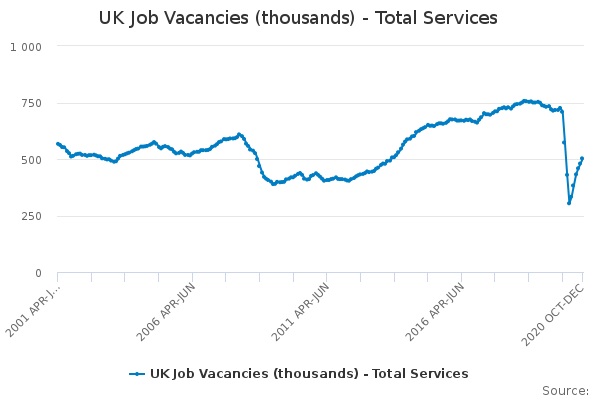
Image: Courtesy of the ONS show that job vacacies has plunged.
Annual growth in average employee pay continued to strengthen, but this growth is increasingly being driven by compositional effects of a fall in the number and proportion of lower-paid employee jobs. Current average pay growth rates are being impacted upwards by a fall in the number and proportion of lower-paid jobs compared with before the coronavirus pandemic; it is estimated that underlying wage growth – if the effect of this change in profile of jobs is removed – is likely to be under 2%.
The UK employment rate, in the three months to November 2020, was estimated at 75.2%, 1.1 percentage points lower than a year earlier and 0.4 percentage points lower than the previous quarter.
The UK unemployment rate, in the three months to November 2020, was estimated at 5.0%, 1.2 percentage points higher than a year earlier and 0.6 percentage points higher than the previous quarter.
In the three months to November 2020, the redundancy rate reached a record high of 14.2 per thousand.
Early estimates for December 2020 indicate that the number of payrolled employees fell by 2.7% compared with December 2019, which is a fall of 793,000 employees; since February 2020, 828,000 fewer people were in payrolled employment.
The Claimant Count increased slightly in December 2020, to 2.6 million; this includes both those working with low income or hours and those who are not working.
There were an estimated 578,000 vacancies in the UK in October to December 2020; this is 224,000 fewer than a year ago and 81,000 more than the previous quarter.
Growth in average total pay (including bonuses) among employees for the three months September to November 2020 increased to 3.6%, and growth in regular pay (excluding bonuses) also increased to 3.6%.
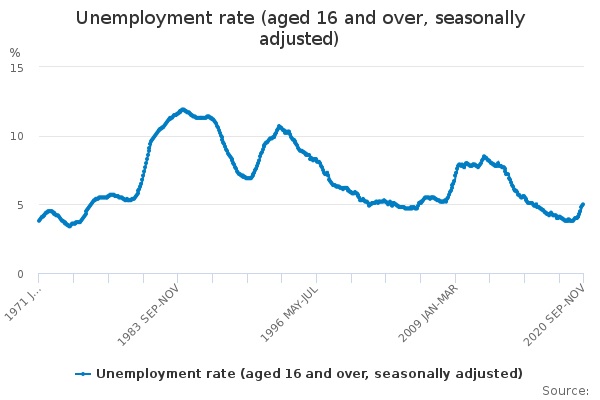
Image: Courtesy of the ONS shows that unemploment is rising due to the pandemic.
ABC Comment, have your say below,

Chancellor Rishi Sunak's Proposed £1,000 Bribe To Accept a Universal Credit Cut
Chancellor Rishi Sunak wants to give claimants of the universal credit welfare benefit a £1,000 one-off sum in exchange for removing the temporary £20 per-week uplift introduced during the pandemic — doubling his previous offer of £500,
The argument is that the cash could trigger a spending spree to help boost the economy when in reality people need the money for food and heating.
In the US stimulus checks of some $1,400 are being looked at by the Biden administration. With some ten million people have lost their jobs this solution might seem attractive. Third stimulus check payments worth $1,400 could be sent out soon, as a follow-up to the $600 checks that reached millions of Americans beginning in late December. The relief money is expected to be part of a $1.9 trillion stimulus bill supported by President Joe Biden's administration.
While the $900 billion second stimulus check relief package, was signed into law by outgoing President Donald Trump just after Christmas, included immediate help in the form of extended unemployment benefits, small business loans, PPE distribution and virus-testing funds, it's still unclear what additional aid the third stimulus check will be packaged with.
So what's the third stimulus check update? As it stands, the proposed third stimulus check amount is $1,400, which, when coupled with the existing $600 check, would get $2,000 to all eligible Americans.
The third stimulus-check eligibility guidelines will likely be a bit more generous than they were for the first and second checks.
More on the UK.
In the UK government sources have argued that one argument for hiking corporation tax to help pay for the pandemic is that lowering the rate to 19 per cent since 2010 might not have brought in the business investment that was hoped for.
Today Labour has been holding an opposition debate on employment rights, following reports the Conservatives could water down EU rules.
Interestingly the Observer has been reporting “British businesses that export to the continent are being encouraged by government trade advisers to set up separate companies inside the EU to get around extra charges, paperwork and taxes resulting from Brexit,”
ABC Comment, have your say below:

ABC Founder Simon Collyer Speaks to BBC Essex Presenter Dave Monk About HSBC Branch Closures
RADIO APPEARANCE - Simon Collyer ABC founder was a special guest on the BBC Essex mid-morning show Thursday 21st January 2021 with presenter Dave Monk.
We chatted about HSBC and their branch closing program announced this week. 82 HSBC branches are set to close. How will this affect the low paid and those with mental health issues?
Is this a trend we expect to see more of as the Internet and technology play an evermore prominent role in peoples lives? But what about those left behind on the wrong side of the digital divide…?
You can tune in to Dave every weekday morning between 9 am and noon for the lifestyle issue that is important to you.
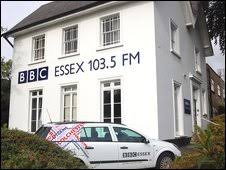
Image: BBC Essex HQ in Chelmsford.
Dave is a fan of local radio and he has had a varied background; including owning his firm of solicitors, a wine bar and bistro, run a disco and worked in nightclubs, as well as lecturing in law. For Simon Collyer, this meant being interviewed by someone with life skills and who has been around the block more than once.
Dave has a great voice for radio, with great warmth, texture, tone, and a touch of humour. Being interviewed on the radio can feel like that you are in the finals at Wimbledon - you know a ball is coming at you, but from what direction, how fast and with how much topspin? It can be a bit daunting, to say the least. Dave’s style puts you at ease straight away and allows you to develop your arguments without feeling you are going to be aggressively jumped on as soon as you have made your first point. Sometimes this style of very aggressive interviewing backs people into a corner and Boris Johnson has been reluctant to appear on some TV shows as a result. That's no good for democracy.
We must thank BBC Essex, presenter Dave Monk and his producer Victoria Polley and Chris Penhall for the opportunity and the exposure.
We have been chatting to June Prunty, PA to the BBC Chairman about how we can get noticed nationally. We must thank June for her advice and guidance in navigating the organisation known so affectionately as 'Auntie'. The BBC is facing competition from Sky and Netflix and many young people use YouTube as their main entertainment medium. News that failure to pay the licence fee is no longer going to be a criminal offense is good news. Many utility companies are coming up with schemes to assist those on benefits, including but not least Virgin Media and Scottish Power. Often these schemes are not advertised. Perhaps the BBC could create a reduced rate scheme for those struggling? It would reduce the motivation to break the law by those who genuinely cannot afford the licence fee in full.
This was our sixth BBC Essex appearance. We long to get into the fray and mix it up nationally - to see that those on low incomes get treated decently - enough to live on, including their children, adequate warmth and to have a roof over their heads. Our time will come, just you wait.

ABC comment: We have had a contact from a US military organisation that helps Vets find their feet, and that has indirectly opened a door into the Pentagon. We want to be able to give more assistance to the military, those serving or in the process of leaving the forces, and of course Vets.

RAC to The Rescue
RAC RESCUE - Flat battery yesterday for the ABC, our staff car imobilized, having left an interior light on overnight. Bong...!
The ABC have always had the most fantastic service from the RAC. To get the title 'Royal' in your name you have to be good, and they are.
Credit where it is due, the problem was soon fixed and we were mobile once more. Staying home is the order of the day and keepng the old 'iron horse' in the garage is the thing to do....Ed 'nay whinny winny'.

ABC Comment, have your say below:






